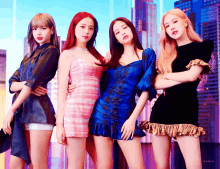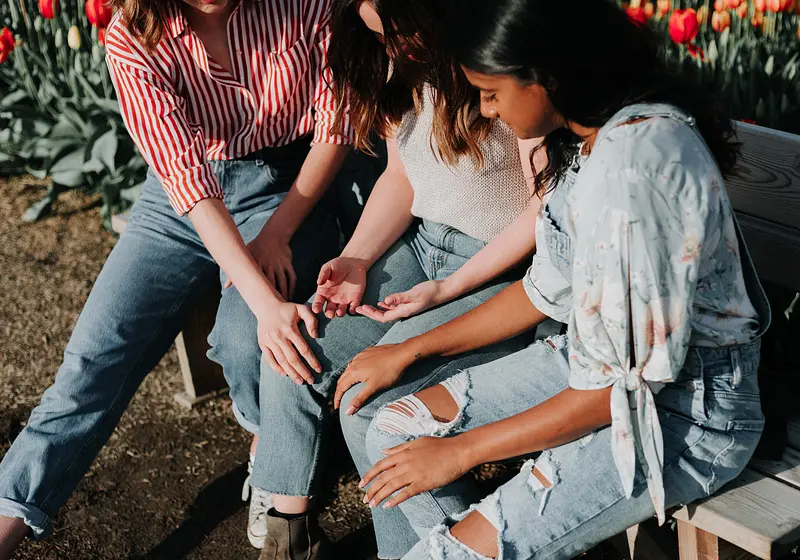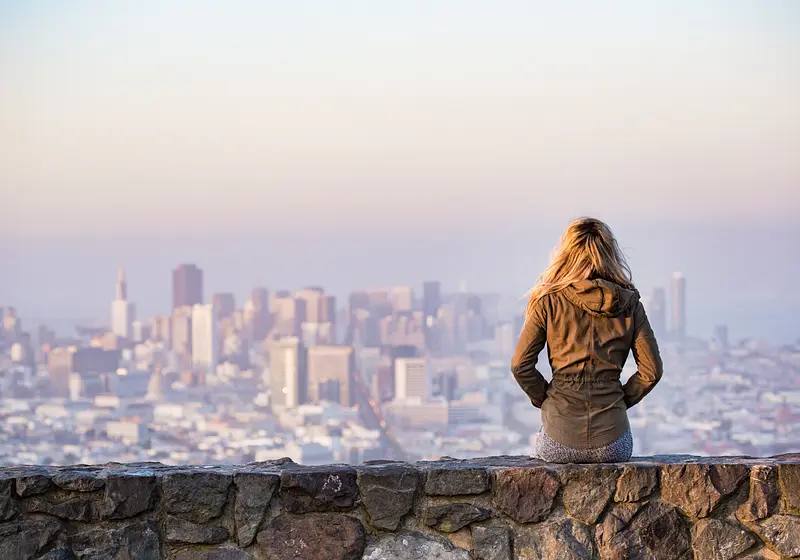The Secret Potential of Gen Z
Gen Z is a novel generation; born between the braindead “iPad kids” and the crabby Boomers, we are the product of an experimental age of new technology, consumerism, and social divergence. We are a double-edged sword: politically conscious, tech savvy, and privileged - yet we have terrible mental health, and we find solace in vices. We seem to have forgotten that we are an essential benefactor in regard to the future of the planet and humanity (a big responsibility, I know), but how can we be of service when we can't escape our own tragic cycles of depression and consumerism?
Don't worry, I'm not here to rag on you, but rather, I'd like to offer up a glimmer of hope.

Image Credit: Adrian Swancar from Unsplash
Let us slide into your dms 🥰
Get notified of top trending articles like this one every week! (we won't spam you)Performative Activism
The first step is to understand the oxymoron that is Gen Z. We are deemed the generation of social justice and climate change activists, yet we are also the generation that consumes the absolute most - and not just regarding spending. In terms of entertainment and social media, our screen time averages are astronomical. Because of popular social media platforms such as TikTok or Instagram, activism has become trendy, convoluting its true meaning and resulting in a surge of what is called “performative activism.”
Performative activism is a term that refers to supporting a cause or issue online or in public for attention, social clout, or monetization, rather than for genuine or meaningful action. That's not to say that all of Gen Z fits this stereotype or are intentionally contributing to this issue, yet performative activism is a natural byproduct of the capitalization of activism. And this is not entirely Gen Z's fault; but rather, they are a victim of large corporations and systemic structures that are constructed to comply with consumerist values to achieve monetization.
Gen Z has a rather bleak outlook on our future due to the environmental disasters, corrupt politics, and violence and disparities between groups. Money-making corporations are well aware of both Gen Zs ethical standards and our poor psychological state and are taking advantage of both through marketing tactics such as greenwashing, PRIDE merchandise and pinkwashing. It seems out of our control (and so overwhelming), but not all hope is lost. By becoming aware of this phenomenon, Gen Z can actively work to oppose this system - and many already are, you just have to know how to find them.

Image Credit: Brian Yarasits from Unsplash
True sustainability is often portrayed as being tasteless or "poor." Because of the group-think aspect of our generation, we unwittingly hop onto this trend; shaming hand-me-downs and public transport, for example. We indulge in “little treats” (a small trinket or food item bought daily, as characterized by TikTok) to keep us “happy.” We flaunt our “hauls” of books, clothes, makeup and more on social media. This prompts feelings of shame and jealousy. It makes viewers feel as if they need to buy in order to fit in, and they feel less-than if they don't participate in this form of consumption.
Take the Quiz: Which Indian city is the perfect holiday spot for you!?
Let's match you with an Indian city that you would love!
Coping Mechanisms
If there's one thing about Gen Z - it's that were self-aware. We are, at least in part, cognizant of our overconsumption. Think of the viral jokes about spending money that you don't have.
Or the “girl math” trend regarding a roundabout way to justify poor financial choices. Or the many references to your wallet/bank account “judging you” for making a purchase that you know you can't afford. I believe this addiction to shopping ultimately stems from the economic disparity that this generation faces: most of us will never be able to afford a house like our forebearers, and the “just work harder” mindset is no longer cutting it. We turn to consumption and instant gratification as a way to cope with (and deny) this reality. Indeed, further evidence lies in the fact that so many of us are blatantly rejecting the idea of having children because we fear the future state of the world and know that childcare is neither affordable nor plausible.
Most of us deal with our worries and issues by turning to TikTok and scrolling for hours or by putting on Netflix. Even beyond media consumption, we turn to drugs, medications, food and more to fill this void. I myself have noticed that I enter a state of paralysis when I open my TikTok.
I know that I should be doing something more productive, but I simply can't force myself to put down my cellphone. This occurrence leads to youth feeling guilty about their lack of productivity and blaming themselves, yet they don't realize that our system is quite literally designed to keep us in this cycle.
But not all hope is lost. Some people are actively working against the aforementioned issues by raising awareness about them online and making “de-influencing" videos to help their peers recognize their over-consumption and question if they truly need the products advertised.
The Consequences
For Gen Z, unfortunately, the curve has become a circle. The aesthetic of activism has remained, but the foundation of the movement has not. HydroFlasks are popular - not because they're a reusable alternative to plastic water bottles, but because they're trendy.
People drawn to the “hippie aesthetic” buy their boho themed clothing from Shein - profiting off the unpaid labor of children, rather than buying the more expensive, yet sustainable and ethical option. Thrifting has become competitive, and resellers are oversaturating the market, raising the prices in thrift stores and making it difficult for impoverished people to access affordable clothing. Protesting has become something that people posts on social media to prove that their politically conscious, yet they fail to make the changes within their own household that support the sentiment.
Intersectionality
What many fail to realize, is that all forms of activism are inherently connected: eco justice; social justice; reproductive justice; etc. This concept of “intersectionality” requires participants to apply a sustainable logic to every aspect of their life, which would mean taking a second look at their consumptive practices. Yet people fail to do this because Western societies are not built to support this process.
The innate sense of community required to achieve this has been forgotten - instead we favor an approach that prioritizes profit and work (thanks a lot Boomers). In order to create a widespread change, community support is one of the most important aspects, yet our poor mental health and excessive media expenditure keeps us isolated and indoors.
So, What Can We Do?
The good news about the intersectional approach is that intersectionality by definition implied the interconnected nature of everything. By this logic, one small action can create a resounding effect that echoes through society. Gen Z-ers wanting to make this change can start by challenging the narrative around consumption and sustainability.
Following that, they can get involved locally and instill small wellness practices in their life that will create steady levels serotonin in the brain, ultimately giving them a truer and more long-term sense of happiness and fulfillment. A natural consequence of refocusing their efforts will be a decrease in consumption and an increase in meaningful activism.

Image Credit: Eugenio Hansen from Wikimedia Commons
Ikigai
By reframing their definition of success and consciously diverting some energy from consumption toward wellness practices, Gen Z can begin to step into their potential to change the structure of society and positively impact the world. A concept that has inspired and supported me as I grapple with our social, political and environmental climate is the Japanese term “Ikigai:” The intersection of what you love, what you are good at, what the world needs, and what you can make a living from.
Implementing this ideology can help you reframe what success means to you, and shift your goals toward supporting your creativity, your values, and your true purpose.
Be The Change
Gen Z uses consumption as a means of escapism, so in order to make a change we must oppose this habit by being present. What does this look like? Sit with your feelings; feel them.
Journal, be in nature, go on a run, join a club. Replace scrolling with learning and limit your screen time. Change your mindset around sustainable practices. Support local artists, small businesses and libraries. Swap clothing, crafts, books, and meals with your friends. Slow down and enjoy the moment.
Talk About It
Many of us despair about our future, yet we often don't speak out about it. We all share these fears to some degree, but it almost feels like taboo to discuss it, leaving so many Gen Z-ers feeling isolated, afraid, and alone. Those who do speak out are often labeled as radical, party-poopers, or too political, and are shut down.
Talking about it makes it seem far too real; too close; inevitable. But talking about it is exactly what is going to save us. Though social media has an addictive quality that can certainly be negative, it can also help us to network and find communities that support us. Facebook groups, zoom meetings and links to in-person activities, events, and clubs can help us. We are capable of utilizing one of our greatest weaknesses (the internet) and turning it into a platform for change and support. We are capable of taking back our own power.

Image Credit: Shane Rounce from Unsplash
A Note for You
I'd like to end this article on a candid note - for all the people out there like myself. I personally struggled for years with the idea that I needed to be solely responsible for a massive change in society. I needed to become a politician and fight the system from within, playing along until I could claw my way to the top and dismantle the legislation.
I despaired over the destruction of Mother Earth, and the failure of the corrupt governmental systems that should be protecting us. It seemed entirely impossible to make a dent, and I felt hopeless; life felt bleak. It was only when I realized that I could begin to make change through smaller, thoughtful actions that I began to enjoy being alive. I began living with intention and authenticity, trusting that by living in alignment with my moral and ethical beliefs, I would bring the right people into my life. Where I had once been pessimistic and nihilistic, I began to lead with compassion and seek out other people like myself. I joined environmental groups, women's circles and local organizations. I remember a massive weight being lifted off my shoulders when I realized that I could use my talents, which once felt useless (like art and writing) to find, inspire, and console other people who feel the same as I do. Thats why I'm writing this article. To let you know: I don't have to do it alone - and neither do you.

















